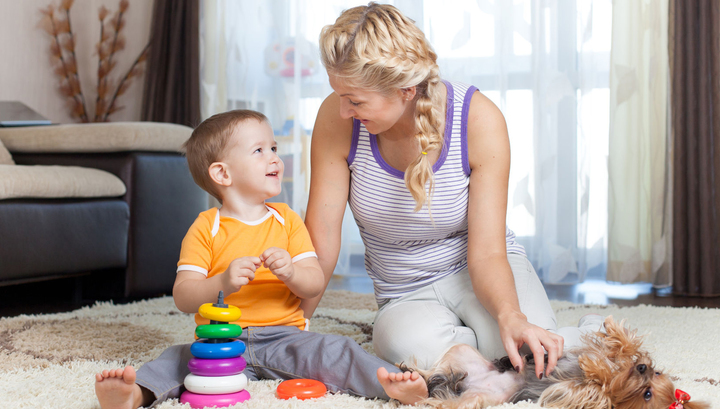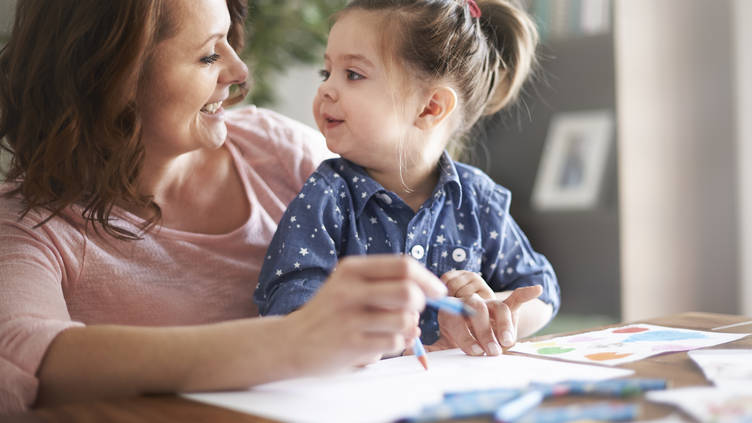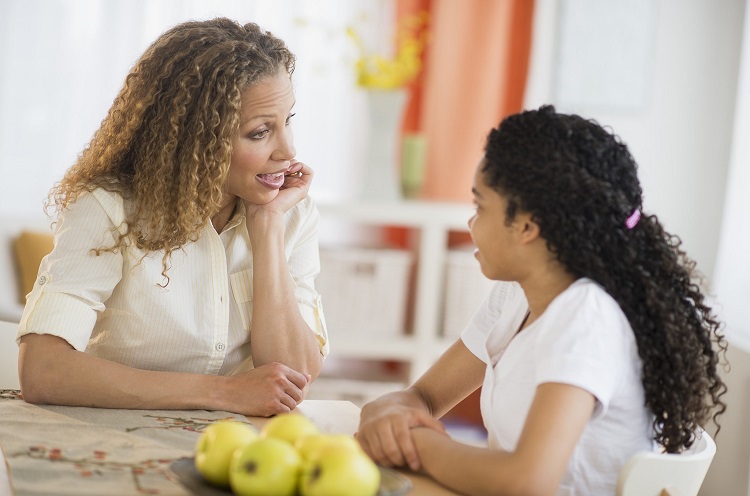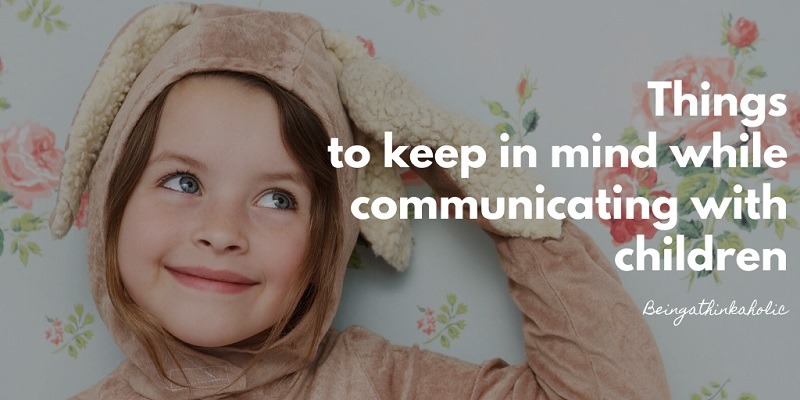While communication is extremely necessary for any relationship, communicating with children can get a little tricky as you need to be careful regarding what you speak and understand how a particular statement will be perceived by the innocent minds. At such a tender age, it might get a little difficult for kids to articulate their feelings and emotions. Thus, there are few things that you need to keep in mind while talking to children.

Table of Contents
Draw attention before you speak
Communicating with children is the most effective when done face-to-face with a proper eye contact. And this is even more important when you are speaking to kids. It should be kept in mind that you have their full attention before you speak. Gestures like holding their hands or a light pat on their back would draw their attention towards you. Only when you have their undivided attention as well as yours, communicate. This is very effective for brain development in children.

Stoop to a child’s level
Communication with your child is meaningful only when you come down to their level and explain things. Kids are sensitive, take one thing at a time and their minds are not as mature as adults. Hence, you need to explicitly speak everything and not expect them to read between the lines. For instance, if you are telling them about a certain activity and the emotion attached to it, speak it completely- the action and the emotion attached, it enhances child psychology.
Mean what you say
Speak firmly. If you want them to do to a certain thing or behave in a particular manner, say that clearly and firmly. Give instructions which are crisp, clear and consistent. Your body language and tone should also match your words. This gives your child an indication that the discussion is serious and should be paid heed to.

Use simple sentences
Use sentences that are simple and easy for them to understand. Asking a kid to do more than one thing can lead to confusion and difficult to remember. It is also important that you express yourself consistently. If you are vexed with a particular action of theirs, do not wait for another incident to happen to explain things to your child. This might send the wrong signal and confuse them since you do not object to the behaviour in the first place but do so in the next. Make clear and precise statements and set mutual expectations right.
Use positive remarks
It is not always easy to tell them the ‘dos’ and ‘don’ts’. Tell what needs to be done than saying what should not be. A positive message is more likely to be accepted and worked on than a negative one. Allow them to make their own choices as it is very essential for child growth and development. Do not instruct them on every action. They are likely to act appropriately when given some level of freedom for their actions.
(You may like to read our post, 6 Tips to Handle Anxiety in Toddlers)

Keep the communication two-way
We often just go on instructing our child without stopping to listen to what they have to say. Keep the communication channel open both ways. It is crucial that you also pay equal attention as you expect from them and it is the art of parenting. It is also important that you maintain a proper eye contact and body language when they speak to you sending a positive signal that you are paying attention to their words.

Encourage and Appreciate
It is important that you use appropriate words and phrases and are encouraging and appreciating them for their actions. However, avoid appreciating them only for one particular task done well. If you are more concerned about their grades, do not just appreciate them when they get good ones and stay mum if they score a little less but make it to the athletics team. Encourage and appreciate them for positive behaviour, initiative taken and success in their specific interests.
You may like to read our post, Why You Should Allow Your Kids to Make Mistakes)

Do not Compare
Keep in mind to not compare your kid with others or siblings. Cite out the expected behaviour but refrain from comparing them with other kids. As it causes behavioral problems in children.
(You may like to read our post, Positive Parenting Tips for Child Development)
Do as you expect
If you are trying to get your kid say ‘please’ and ‘thank you’, make sure that you include them in your conversation. Say the words when you speak to them helping them pick up the habit. At that age, parents are the only individuals that a child spends most of the time with and is likely to imitate their words and actions. So, keep in mind to use the right words and phrases.
A positive communication helps the child to build a strong personality, be self-confident, feel self-worth and carry the positivity to the other relationships in the future. Hence, it is extremely important that you ensure to have a positive communication with your child.
You may also like to read:
https://time.com/65324/7-powerful-tips-for-great-parent-child-communication/





Great post .The pointers are well elaborated and has an practical approach. At times we think as a parent we are right but still kids don’t listen to us. These pointers would definitely help in our parenting journey.
Glad you find the points mentioned helpful. Happy parenting 🙂
I enjoyed reading the post because of the comprehensivity . It covered almost all aspects of positive parenting. I completely agree to all points mentioned by you. Being respectful to the kids while communicating is the key to a strong bond/ relationship. The parents definitely need to walk the talk and set the right examples for kids to follow. Very informative and relevant post 🙂
Thank you so much for reading and I am glad you like the post. Positive parenting is a great way to build the lifelong bond with your child.
Great points Aarushi and I agree that communication with kids requires some kind of modification and we have to keep certain things in mind. stoop to a child’s level is one of the most important thing that most of the parents ( including me) forget, thanks a lot for putting all these together. will help a lot in positive communication with kids.
Thanks Surbhi for reading. Glad you like the post. 🙂
I wish schools had classes for parents on how to communicate. Thanks for sharing this blog which is very comprehensive about the topic. The attention span of kids is so limited and to catch their attention and communicate is an art that needs to be mastered.
It surely is an art and its sad no one teaches us. It is when we practice we realize small things do matter. Thanks for reading. 🙂
Lovely post Arushi. My parenting style really matches yours and I always appreciate your inputs.
Thanks Noor. Glad you agree with my parenting style. 🙂
These are simple but important points that we all need to know when talking to kids. I really like the fact that the points are easy to implement. We are not all born with the intuition to know these things, so it’s always nice to have someone compile this for us.
Thanks for appreciating. These are simple ways and they make a huge difference. Glad you found the post helpful 🙂
This is a important and a helpful post Arushi. Soemtiems we forget and we tend to take out our frustrations on our kids but what impact is has on a kids mind is immense! One should keep in mind that the same thing can be explained in a better and a positive way
Yes, while I agree its easier said than done, but a conscious effort makes a lot of difference. Thanks for reading. Glad you found the post helpful 🙂
Very well written. Thanks for the reminders. Could really use some points at the moment. Comparison between kids is definitely a no-no.
Thanks for reading. Glad you like the post. 🙂
[…] (You may like to read our post, Things to Keep in Mind When Communicating With Children) […]
[…] talking to them and teach them how to express themselves and not cry. Some children do not know how to […]
[…] (Read our post, Things To Keep In Mind While Communicating with Kids) […]